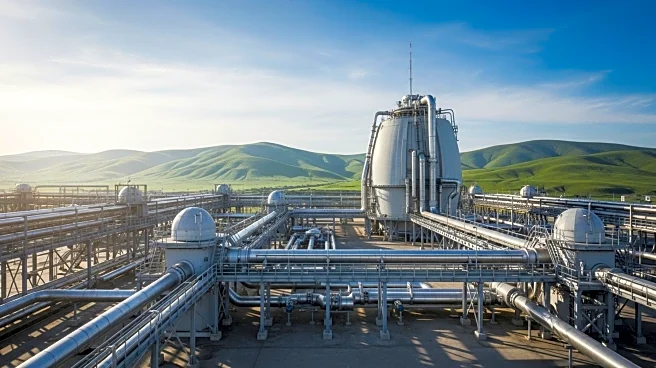What is the story about?
What's Happening?
Arup, an environmental consultancy, has been appointed by Peak Cluster to lead the environmental impact assessment (EIA) and prepare the technical documentation for the development consent order (DCO) for the Peak Cluster project. This project aims to address the significant CO2 emissions from cement and lime production in Derbyshire and Staffordshire, which account for 40% of the UK's output in these sectors. The project involves developing carbon capture facilities at plants operated by Tarmac, Buxton Lime, Breedon, and Holcim. The captured CO2 will be transported via a proposed underground pipeline to Spirit Energy’s Morecambe Net Zero site for permanent storage. Arup, supported by AECOM and Quod, will oversee the EIA and DCO, ensuring a comprehensive assessment of environmental effects during construction and operation.
Why It's Important?
The Peak Cluster project represents a significant step towards reducing carbon emissions in the UK’s cement and lime industries, which are major contributors to the country's overall CO2 output. By capturing and storing CO2, the project aims to secure a sustainable future for these industries, potentially serving as a model for similar initiatives across Europe. The involvement of the UK National Wealth Fund underscores the project's importance in the national strategy for a low-carbon economy. Successful implementation could lead to job security, the production of low-carbon products, and growth in the UK’s supply chain and skills base, positioning the country as a leader in low-carbon technology.
What's Next?
The next steps involve Arup conducting a detailed environmental impact assessment and preparing the necessary documentation for the development consent order. This will include evaluating the environmental effects of the proposed pipeline and carbon capture facilities. The project will also need to coordinate with Spirit Energy’s offshore infrastructure for CO2 storage. As the project progresses, it will likely attract attention from environmental groups, industry stakeholders, and policymakers interested in carbon capture and storage technologies.
Beyond the Headlines
The Peak Cluster project highlights the growing importance of carbon capture and storage (CCS) technologies in achieving climate goals. It raises questions about the scalability of such projects and their potential to transform high-emission industries. The project's success could influence regulatory frameworks and investment strategies in the UK and beyond, encouraging further development of CCS infrastructure. Additionally, it underscores the need for collaboration between public and private sectors to address environmental challenges.
















